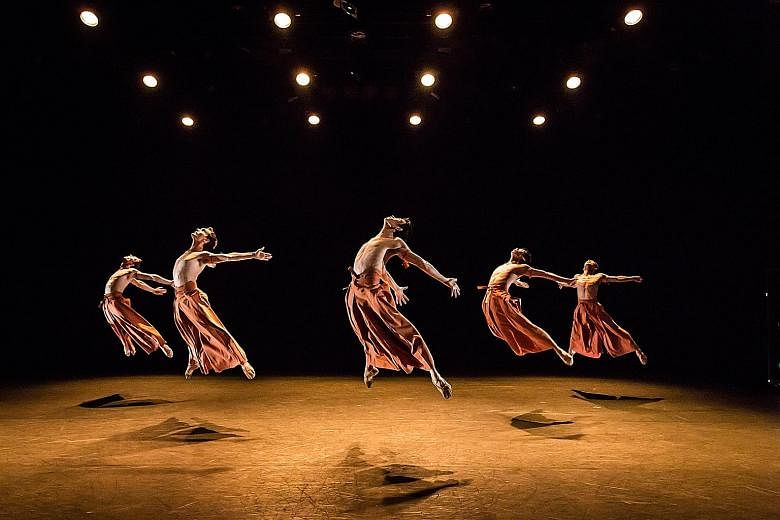REVIEW / DANCE
PASSAGES
Singapore Dance Theatre
Esplanade Theatre Studio
Sunday
Dance is a balancing act, and not just when a dancer is up on the ball of one foot, trying to keep centred as he spins around in a series of pirouettes. Each piece is a precarious teeter-totter between choreography, artistry, technical prowess, individuality and the collective.
The relatively small quarters of the Esplanade Theatre Studio, where the Singapore Dance Theatre's latest season of Passages took place, tips the balance in favour of the company in some ways.
Without the coolness of distance that separates an audience from the performers in a larger theatre, it is harder to critically observe a company's lines, form and shapes, and with the unavoidable audience heads bobbing in front of you, footwork is occasionally masked.
But when you can see each lean and rippling sinew in the performers' bodies, it is not their feet you will be focusing on very much.
Instead, when the dancers are in such sharp relief that the audience can see every twitch of their face and count the number of front teeth they have if concentrating hard enough that artistry and physical expression become paramount.
In this respect, SDT has been in a state of imbalance, with the female members of the company frequently outshining the males.
Whether it was Li Jie's elegance or Chua Bi Ru's brightness in Piano Concerto No. 2, Opus 102, Chihiru Uchida's dainty poise, or the way the female corps pulsated with dark, magnetic intensity in Another Energy, they commanded all the attention.
They were matched occasionally by Etienne Ferrere, who threw coy glances at Chua in Piano Concerto, and Reece Hudson, who used his long limbs to great comedic effect as he wriggled and bopped in Christina Chan's light-hearted Unfound.
Otherwise, the male dancers were sometimes reduced to forgettable tools of utility to lift and support the women in pas de deux or ensemble numbers.
Gender roles are far less entrenched in modern versus classical works, where the latter heralds a certain hyper-feminised ideal in ballerinas. But when placed on more equal footing here, the balance tipped in favour of the women.
Most of the works in Passages were created especially for the company, all of them contemporary pieces.
The company has not always looked comfortable with its classical repertoire, but in a season of modern works tailored for the technical abilities and talents of the company, the afternoon tipped towards delightfully engaging.
Piano Concerto, a piece of the Balanchine ilk, was a serviceable beginning, but it was Tim Harbour's sensational Another Energy that kicked the afternoon up a notch.
The artistes danced in packs to the urgent sounds of string instruments, roving like wild things in shades of light and dark against a simple backdrop evocative of a lunar eclipse.
One hopes it remains firmly in SDT's repertoire as the company continues to discover and refine it.
The ominous tones of the piece were balanced out with Unfound, a pas de deux best described as a holiday trip on hallucinogens, where sunglasses-clad Chua and Hudson executed supple, fluid choreography in the same breath as far less refined dance moves, a choreographic equivalent of two tourists on a beach shimmying and bumbling around while on mood-enhancing opiates.
The uplifting, African-inspired audience favourite Jabula, by Natalie Weir, rounded out the afternoon.
Passages is a season that highlights the strengths and weaknesses of the companies in equal measure.
But on the balance of probabilities, this was a thoroughly enjoyable showing by the dance company.

